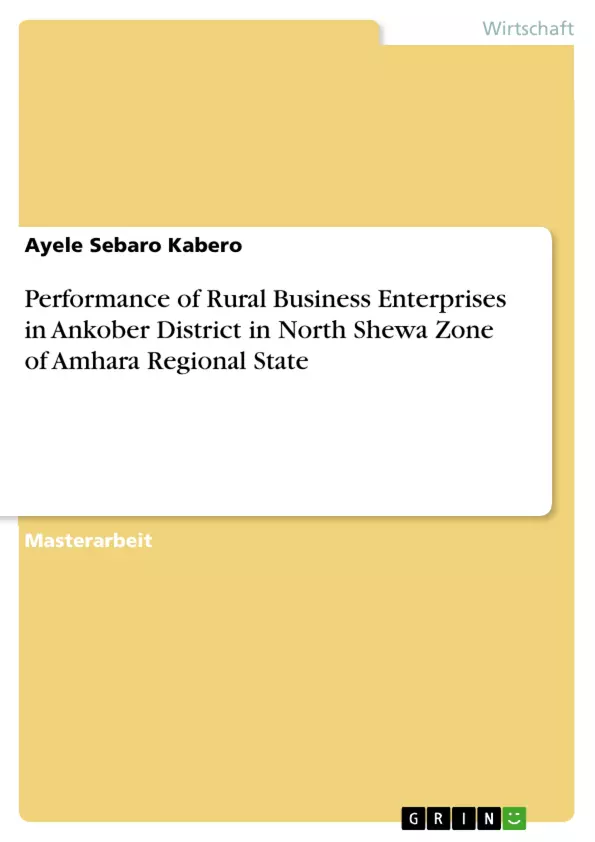This study was conducted to investigate the performance of rural business enterprises in terms of improving socioeconomic condition of rural people and contributing for improved rural-urban linkages in Ethiopia. It was carried out in Ankober district to contribute towards filling the gap on the knowledge and understanding about the performance of rural business enterprises in Ethiopia.
The study used 105 rural businesses selected using simple random sampling proportional to size. It also used 4 Focus Group Discussions and 5 Key Informant Interviews; purposely selected based on their knowledge and experience in rural business. The data was analyzed using descriptive statistics. The result indicates that ownership of rural business enterprises is dominated by male headed households (79% male) which imply that women face more limitations to engage in formal businesses due to limited access to capital among others. The finding also indicated owning rural business enterprise significantly contributed for the socioeconomic improvement of the business owners. The annual income of the enterprise owners is 1.94USD per person per day, which is significantly greater than rural households’ income in Ethiopia, which is 0.8 USD. Rural businesses are main source of income for 85.7% of enterprise owners. But the income is season sensitive and depends on agricultural performance. Annual non-food expenditure of the enterprise owners is 186.83 USD in 2013/2014 and 177.1 USD in 2015/2016, which is higher than the national average; 112.66 USD.
Rural business enterprises contributed for the improvement of the enterprise owners’ quality of life. Rural enterprises also contributed to enhanced rural urban linkage through increased demand for the urban products in the rural areas and for rural products in the urban areas which is being met by the rural business enterprises. Rural enterprises also resulted in enhanced interaction between rural and urban areas through their collaboration with urban businesses which has contributed to improved rural urban linkage.
Inhaltsverzeichnis
- Chapter one: Introduction
- 1.1 Background of the study
- 1.2 Statement of the problem
- 1.3 Objectives of the study
- 1.3.1 General objective
- 1.3.2 Specific Objectives
- 1.4 Scope and limitations of the study
- 1.4.1 Scope of the study
- 1.4.2 Limitations of the study
- Chapter Two: Literature review
- 2.1 Important concepts and definitions
- 2.1.1 What is rural business?
- 2.2 Role of RBEs in Improving Socio-economic Development of Rural Areas
- 2.3 Contribution of RBES for R-U linkage
- 2.3.1 What is Rural Urban linkage?
- 2.3.2 Significance of Rural-urban linkage
- 2.3.3 The Contribution of RBEs in facilitating R-U linkage
- 2.4 Conceptual Framework
- Chapter Three: Methodology
- 3.1 Site Selection and Description of the Study Area
- 3.2 Research Strategy and Design
- 3.3 Data Type and Sources
- 3.4 Target Population and Sampling Design
- 3.5 Data Collection Methods
- 3.6 Data Processing and Analysis
- 3.7 Validity and Reliability
- 13.7.1 Validity
- 3.7.2 Reliability
- Chapter Four: Results and Discussion
- 4.1 General Profile of Respondents
- 4.2 Characteristics of Rural Business Enterprises Operating in Ankober District
- 4.3 Role of RBEs in improving socio-economic development of rural areas
- 4.3.1 Income
- 4.3.2 Consumption expenditure
- 4.3.3 Employment Creation for other people
- 4.3.4 Provision of goods and services
- 4.3.5 Improving quality of life
- 4.3.6 Reduction of migration
- 4.3.7 Contribution to community development
- 4.4 Contribution of Rural Business Enterprises for Improved Rural-Urban Linkages
- 4.4.1 Rural Business Enterprises Demand for Urban Products
- 4.4.2 Urban Demand for Products of Rural Business Enterprises
- 4.4.3 Rural Business Enterprises interaction and relationship with urban businesses
- 4.4.4 Frequency of Rural Business Enterprise Owners' visit to urban areas
- 4.5 Challenges faced by RBES
- Chapter 5: Summary of Results, Conclusion and Policy Implication
- 5.1 Summary of Results
- 5.2 Conclusion
- 5.3 Policy implication
Zielsetzung und Themenschwerpunkte
Die vorliegende Arbeit untersucht die Leistung von ländlichen Unternehmen in Ankober, einem Bezirk in der Nord-Shewa Zone des Amhara Regionalstaates. Die Studie zielt darauf ab, die Rolle dieser Unternehmen für die sozioökonomische Entwicklung der ländlichen Gebiete und die Verbesserung der Land-Stadt-Verknüpfung zu analysieren. Sie analysiert außerdem die Herausforderungen, denen ländliche Unternehmen gegenüberstehen.
- Die Bedeutung von ländlichen Unternehmen für die sozioökonomische Entwicklung
- Der Beitrag von ländlichen Unternehmen zur Verbesserung der Land-Stadt-Verknüpfung
- Herausforderungen, denen ländliche Unternehmen gegenüberstehen
- Die Rolle von ländlichen Unternehmen bei der Steigerung des Einkommens und der Beschäftigung
- Die Auswirkungen von ländlichen Unternehmen auf die Lebensqualität und die Migration
Zusammenfassung der Kapitel
- Kapitel 1 stellt den Hintergrund der Studie vor, definiert das Problem und formuliert die Forschungsziele. Es beschreibt den Umfang und die Grenzen der Studie.
- Kapitel 2 bietet eine umfassende Literaturübersicht zu wichtigen Konzepten wie ländliche Unternehmen und Land-Stadt-Verknüpfung. Es analysiert die Rolle von ländlichen Unternehmen bei der Verbesserung der sozioökonomischen Entwicklung und die Bedeutung der Land-Stadt-Verknüpfung.
- Kapitel 3 beschreibt die Methodik der Studie, einschließlich der Standortauswahl, der Forschungsstrategie, der Datentypen, der Stichprobenentnahme und der Datenanalysemethoden.
- Kapitel 4 präsentiert die Ergebnisse der Studie, einschließlich der Charakterisierung der ländlichen Unternehmen in Ankober und ihrer Rolle für die sozioökonomische Entwicklung und die Land-Stadt-Verknüpfung. Es analysiert auch die Herausforderungen, denen diese Unternehmen gegenüberstehen.
- Kapitel 5 fasst die Ergebnisse der Studie zusammen und zieht Schlussfolgerungen. Es formuliert politische Implikationen basierend auf den Erkenntnissen der Studie.
Schlüsselwörter
Die wichtigsten Schlüsselwörter dieser Arbeit sind ländliche Unternehmen, sozioökonomische Entwicklung, Land-Stadt-Verknüpfung, Herausforderungen, Einkommen, Beschäftigung, Lebensqualität, Migration, Amhara Regionalstaat, Ankober.
- Quote paper
- Ayele Sebaro Kabero (Author), 2017, Performance of Rural Business Enterprises in Ankober District in North Shewa Zone of Amhara Regional State, Munich, GRIN Verlag, https://www.grin.com/document/380384



